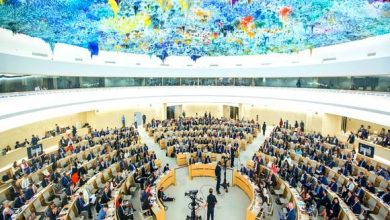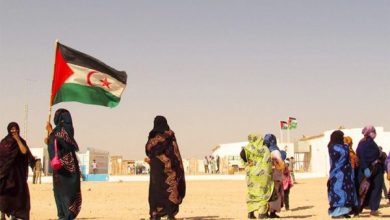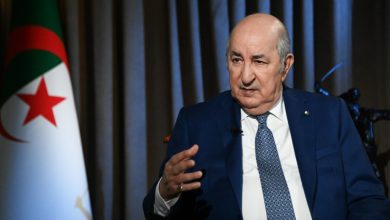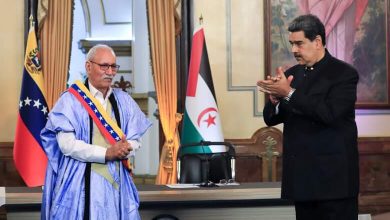
45 Moroccan cities erupted in protest marches and massive demonstrations of anger in the last two days. The demonstrations were organized in response to the call of the “Moroccan Social Front,” as well as many human rights, labor, and political organizations. The protesters were peacefully raising legitimate demands for better living conditions.
Meanwhile, the government has been content to use a heavy-handed approach, cracking down on the protesters and perpetuating their repression. This has caused frustration and anger to boil over, leading to the widespread protests seen across the country. The protests are a clear indication of the growing frustration and dissatisfaction with the government’s policies, and the people’s desire for change and reform.
Despite the government’s attempts to quell the protests, they continue to spread and gain momentum. The protesters are determined to make their voices heard, and to bring about the change they seek. It remains to be seen how the government will respond to these demonstrations, and whether they will take steps to address the legitimate concerns of the protesters.
Rabat also witnessed a massive protest march against the skyrocketing prices of essential goods, as well as the oppressive rule of the Akhannouch government, which has failed to fulfill its promises in various areas and has dealt a blow to pension rights. In addition, the protesters condemned the police siege and the rampant corruption within the government.
The protesters voiced slogans such as “enough of high prices” and “the people demand the release of detainees” and “death rather than humiliation” and “freedom, dignity, social justice.” They also held up banners that read “united against the high cost and impoverishment of our people” and “we are citizens, no rights, no laws,” as shown in video on social media.
Protestors condemned the rampant corruption and suffocating police siege, they called for the downfall of the Zionist-Moroccan normalization and the release of prisoners of opinion and expression.
This comes at a time when Morocco is experiencing increasing social tensions due to rising prices, amid accusations against the government of “delaying” in taking sufficient measures to support citizens from the poor and middle classes.
It was crystal clear, in recent days, to see the size of the popular anger and the expression of concern from the opposition and labor unions about the deterioration of the economic situation due to the policy pursued by the government in dealing with the rise in the prices of a number of consumer goods, which has affected the budget of citizens and their purchasing power.
Human rights activist Khadija Ryadi commented on the demonstration called for by the Moroccan Social Front, which is made up of several human rights activists, saying that it came as a result of “the very deteriorating social situation in Morocco due to the high cost of living.”
She added, “All social and economic indicators are deteriorating, and this is an opportunity to remind our officials that the Moroccan people want social justice and that they have the right to enjoy it.”
The organizers of the protest said in a statement after the end of the protest that “the people expressed their determination to confront corruption and tyranny and their thirst for freedom and dignity.”
The statement emphasized “the social demands, foremost among which are the issues of high cost of living and increases in the prices of basic commodities”.
In the same context, the regional and local secretary of the Democratic Confederation of Labor and a member of its executive office, Otman Baka, explained that the march was a protest against the non-populist government policy that made large farmers and traders export vegetables at a time when Moroccan citizens who produce them cannot find them. He added that it “criticizes the government policy that has put the national food security at risk and made large traders chasing only hard currency”
Once again, the ongoing marches and protests in Morocco have been marred by a heavy-handed police response and strict security measures. Despite the peaceful intentions of the protesters, the authoritarian government has resorted to violent tactics in an effort to suppress dissent.
In particular, the events of the past two days have been marked by egregious abuses of power from security forces. This has only served to further inflame tensions and underscore the urgent need for systemic change in Morocco.
Nabila Mounib, a prominent Moroccan parliamentarian and the Secretary-General of the Unified Socialist Party, has drawn attention to the plight of ordinary citizens who are struggling to cope with skyrocketing energy prices. In her view, this is largely due to the monopolistic practices of a small group of wealthy families who have monopolized the fuel market.
Mounib’s comments are a thinly veiled reference to Abdelaziz Akhannouch, who serves as both the Prime Minister of Morocco and the owner of a company that controls the import, distribution, and sale of fuel. According to reports, four Moroccan families – including Akhannouch’s – have amassed over 45 billion dirhams (more than 4 billion euros) via their control of the energy sector.
She considered that the Moroccan Kingdom is not deeply aware of the crisis today and is embarking on regional water and electricity projects, selling energy at higher prices, which will worsen the social situation, in light of the government’s refusal to take necessary measures such as capping the prices of fuel, vegetables and meat to maintain a minimum standard of living for the Moroccan citizen.
In her statement, the speaker emphasized that the issues facing Morocco go beyond just the rising prices of energy and consumer goods. She pointed out that there are also problems with the imposition of contracts in the education sector and the decline of healthcare services, especially after the government moved the healthcare sector to the intensive care unit, which is on its way to being privatized.
she confirmed that the issue is not only related to energy and consumer goods prices, but also to the working contracts in education sector, and the deterioration of healthcare sector, which is on its way to privatization.
She stressed that the matter is not only related to energy and consumer prices, but also to the imposition of contracting in education, and the deterioration of the level of treatment after the introduction of the health sector in Morocco to the recovery room, which is on its way to privatization.
Expressing her concern for the wellbeing of the Moroccan people, the parliamentarian criticized the ruling regime for neglecting its responsibility to protect their citizens’ purchasing power, dignity, and ensure a bright future for the younger generations in terms of healthcare, education, and a decent standard of living. She expressed deep regret that the government has not taken necessary steps to safeguard the interests and rights of the people they serve.
This situation has sparked outrage among many Moroccans, who see it as emblematic of the entrenched corruption and cronyism that pervades their political system. As citizens continue to suffer the consequences of rising energy costs, the need for reform – and for holding those in power accountable – has never been more urgent.





